Mary-Jane Atwater
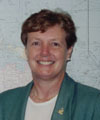
Mary-Jane Atwater
Director of Communications The Maureen and Mike Mansfield Foundation Mike Mansfield once said, “… a vigorous program of exchanges is the surest way, over the long term, to build a true community of Asia-Pacific nations.” At the time, Mansfield – a former U.S. ambassador to Japan, U.S. Senate majority leader and U.S. congressman from Montana – had no idea that Senator William V. Roth, Jr., (R-Del.) and Diet member Yoshimasa Hayashi, who served as an intern in Roth’s office, would in 1994 propose that the U.S. Congress create a first-of-its kind exchange program named in Mansfield’s honor.
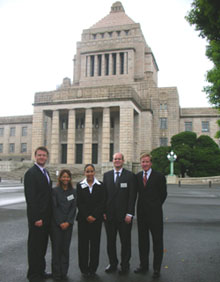
The Mike Mansfield Fellowship Program, now in its 13th year, is a government-to-government exchange that is building Japan expertise in the U.S. government and advancing US-Japan policymaking and cooperative programs. The Mansfield Foundation administers the program with a grant from the U.S. Department of State and generous support from the government of Japan, Central Japan Railway Co., Ishikawa Prefectural Government, Matsushita Electrical Industrial Co., Northwest Airlines, and Toyota Motor Corp. The Mansfield Fellowship Program serves as an outstanding example of the value of professional exchanges where participants – both American Fellows and their Japanese hosts – learn to transcend cultural and language barriers to foster and strengthen trusting, collaborative relationships. The program enables a select group of U.S. federal employees (80 to date) to develop an in-depth understanding of Japan and its government through yearlong placements in Japan’s government ministries and agencies, preceded by a year of full-time Japanese language training and area studies. One key to the program’s success is the ongoing collaboration with the government of Japan, which over the past 13 years has worked with the Mansfield Foundation to provide meaningful placements for the Fellows and opportunities for them to enhance their understanding of Japan. There is no profile of a “typical Fellow.” Mansfield Fellows represent a variety of professional specialty areas in U.S. government agencies and the U.S. Congress. They include lawyers, economists, doctors, military officers, policy analysts, international trade specialists, scientists, and research specialists. They work in fields as diverse as defense and security, healthcare, energy and the environment, trade and economics, telecommunications, transportation, education, and banking. Currently, the 80 Mansfield Fellows represent 22 agencies of the U.S. government, as well as the U.S. Congress. However, there is one trait all Fellows share: a desire to learn more about Japan and its government, people and rich culture. Fellows begin the two-year program with 10 months of intensive Japanese language training and area studies classes, held in the Washington DC area. During the first year, they also develop a detailed placement plan for the year in Japan, tailored to the interests of their agencies and the Fellows’ expertise and professional interests. At the end of the first year, the Fellows travel to Japan to participate in six weeks of language training and a homestay in Kanazawa, Ishikawa Prefecture. The second year of the program is spent primarily in Tokyo, where Fellows are posted full time to agencies and ministries of the Japanese government. They attend meetings with their Japanese counterparts, work on projects together, and occasionally travel to international conferences in Asia. Many Fellows take advantage of the opportunity to have brief placements in the offices of a Japanese Diet member or in private sector organizations. They also attend language classes and participate in study tours offered by the Ministry of Foreign Affairs and National Personnel Authority. While in Japan, Mansfield Fellows develop a deep, practical understanding of Japan that benefits their agencies’ Japan-related programs and policies. Once they return to the U.S. government, alumni Fellows have a true insider’s perspective on Japan’s government, as well as a network of contacts that helps their agencies develop cooperative programs and paves the way for greater bilateral collaboration and understanding. As one alumnus says, “The relationships I built, the language skills I developed, and the exposure to Japanese government that I gained through the Fellowship provide the foundation for both recognizing cultural gaps and, more importantly, understanding how to bridge them.” Alumni Fellows also share their expertise with others. With support from the Japan Foundation Center for Global Partnership and the Toshiba International Foundation, the Mansfield Foundation has organized more than a dozen outreach programs throughout the United States and Japan that feature alumni Fellows speaking on policy-related matters. Not surprisingly, the Fellows always mention the life-changing value of their experience in Japan. Before he died in 2001 at age 98, Mike Mansfield always made it a point to attend the annual reception hosted by the ambassador of Japan and held at the Embassy of Japan in Washington to honor the Mansfield Fellows. Perhaps no one was more proud of the Fellows and their accomplishments and as pleased with the US-Japan cooperation that makes the program possible. Indeed, Mansfield could see that this exchange was creating a true US-Japan community that would leave an enduring mark on the US-Japan relationship for years to come.
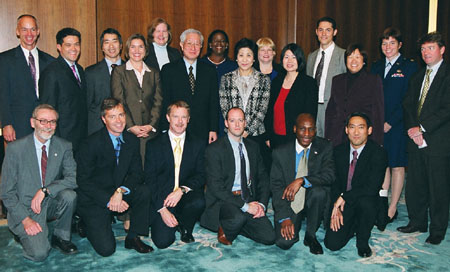
The Mansfield Fellows at the Japanese Embassy’s reception in 2004, Washington, D.C. (Photo courtesy of The Mansfield Foundation)
John Hill Principal Director for East Asia, U.S. Department of Defense Mansfield Fellow, September 1996-September 1997
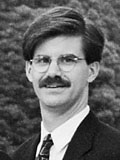
John Hill
Before the Mansfield Fellowship, I had no prior experience in Japan. My academic experience had been in national security studies, largely focusing on the United States, Western Europe, and NATO. In the Defense Department, I was working in what was more of a functional office than a regional office. I was dealing with a lot of international defense industry issues, and had also worked in an office that dealt with funding issues concerning the 1991 Gulf War. In both of those areas, I had some dealings with the Japanese. I kept running across US-Japan issues in my portfolio, and found that the alliance relationship was very interesting. My most intensive experience with Japan up to that point was with the Gulf War. Our office was responsible for putting together the program under which we collected a lot of funding from such countries as Saudi Arabia, the UAE, Japan, and Germany. We were responsible for managing that program from the perspectives of both negotiation and execution. I had the opportunity to see a lot of what worked and what did not work, as well. From that, I got more experience with the US-Japan relationship and found that it was something worth working on. When the Mansfield Fellowship program came along, I was about 10 years into my career. I decided to take some time to pursue the outside continuing education and experiences it offered, and then go back to the Department with that. It seemed like the right time to do that kind of program. My host agency in Japan was the then-Japan Defense Agency (now Ministry of Defense), specifically the Bureau of Equipment, Coordination Division. Through my experience there, I developed an understanding of Japan’s self-defense acquisition system and the possibilities for industrial and technological cooperation between the U.S. and Japan. I also had the opportunity to explore acquisitions and security issues from the business perspective at Keidanren and the then-MITI (now Ministry of Economy, Trade, and Industry). I was in the first class of Mansfield Fellows. I believe the program has made some adjustments since then to address some of the challenges that we faced at the time, particularly regarding language. The program has added a home-stay experience and more in-country language training up front, which helps to get people a little further along in their training. Back then, we had about 10 months of language training and then were thrown right into it, and so the second year was a real intense effort to use Japanese and make the most of it. I think in my case, it went pretty well. It was the first Asian language I studied, but not my first foreign language. I had studied French, German, and Italian back in college, and knew how to approach learning a foreign language. Of course, I was thrown into an environment with lots of technical terms, and, with Japanese, there are so many different ways of using it: business styles, highly formal styles, polite styles, and of course hanging-out-at-the-bar styles. So, getting command of at least one version of the language that you can speak in a straightforward, plain way is one thing, but getting command of enough vocabulary to be able to understand how other people are talking in a much wider varieties of styles is another. I ended up joking with people that I learned how to speak very stiff, bureaucratic Japanese, so when I was chatting with the neighbors, I ended up sounding like a bureaucrat. There is only so much you can do with the language in one year’s time, and I think that the language is still the biggest hurdle for everybody. That’s just in the nature of learning a language that is so totally different from one’s native language. I think the Mansfield Fellowship gave me a chance to challenge my Japanese counterparts’ stereotypes, and, in turn, to let my own stereotypes of Japan be challenged. When I ran across Japanese colleagues who had preconceived notions about Americans – and there were a lot of them – I always wanted to leave them with a sense that the stereotype might not be true across the board. For example, everyone was always asking whether I would eat this or that, because they held the stereotype that Americans are very picky and won’t eat different things. I never let them find anything that I wouldn’t eat. They also defied some of their own stereotypes. We’re told a lot about all the late-night drinking and so forth, but I noticed there were plenty of people from the office who were drinking oolong tea instead of whisky, and who didn’t have any problem telling those around them that they didn’t want to get drunk. My reentry to the Defense Department after the Mansfield Program was pretty much determined in advance. From September 1997 to January 1999, I went to the Japan Desk and was responsible for things that the Department of Defense and the then-JDA worked on together, including some of the early negotiations on Missile Defense cooperation. In January 1999, I switched out of the acquisition side of the Defense Department over to the policy side, and took over the Japan shop there, which handles all the alliance management issues of U.S. Forces in Japan, including the negotiations on alliance transformation and defense posture, and Japan’s participation in Operation Enduring Freedom and Operation Iraqi Freedom. My current assignment includes Japan, the Korean Peninsula, China, Taiwan, and Mongolia. I oversee my old office and have the wider portfolio as well. My Mansfield experience is still very much applicable, because Japan is really at the heart of the Defense Department’s work in Asia-Pacific security affairs. I’m working even today with people I met back then as a Mansfield Fellow. In my case, I really made a career change as a result of doing the Mansfield Program, a change in the whole direction of my career into the Asia policy area. While I studied national security strategy and international relations generally in the past, I’ve been applying it specifically to the Asia-Pacific region now since 1995, when I started the Mansfield Program.
Jennifer Sklarew
International Trade Specialist, U.S. Department of Commerce International Trade Administration, Office of Japan Mansfield Fellow 2003-2005 The views expressed are those of the author and do not necessarily reflect those of the Department of Commerce.
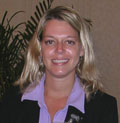
Jennifer Sklarew
I was born in Okinawa and relocated to the United States at the age of two. Since then, I have spent varying amounts of time in Japan as a student in Hakodate, a columnist for a Japanese newspaper in Morioka, an energy and trade consultant, and an international trade specialist in the U.S. Department of Commerce’s Office of Japan. Through these experiences, I came to know, respect, and cherish different aspects of Japanese culture and US-Japan relations. A year in Tokyo as a Mansfield Fellow added a unique and vital element to my understanding of Japan: a window into Japan’s policy-making process. It also provided an opportunity to exchange views and forge friendships with a variety of Japanese government officials, businesspeople, and academics. I spent the year in five government agencies and offices: the Ministry of Economy, Trade and Industry’s Industrial Structure Policy Division and International Economic Affairs Division; the Ministry of Foreign Affairs’ Second North America Division; the Cabinet Office’s Economic and Fiscal Policy Division; and the office of Lower House Diet Member Taro Kono. My time in these offices provided a priceless opportunity to see firsthand the different roles each plays in Japan’s trade and economic policy-making process, and how they interact with one another. I knew of the Japanese bureaucrat’s legendary long workday before I spent time in the Japanese government. As a Fellow, I observed one cause that reflected a prominent difference between American and Japanese policy-making processes. During my time in the ministries and the Cabinet Office, I learned that my colleagues would work late into the night answering questions from Diet members on various policy issues. My time in the Diet revealed one of the reasons: an extremely small staff of one to three policy secretaries. Members of the U.S. Congress have large staffs to handle research on policy issues. While civil servants in the executive branch may testify before Congress or answer questions, we do not routinely work late in order to prepare documents in response to congressional inquiries under tight deadlines. Beyond learning about Japan’s policy-making processes, I also got to know my counterparts in the trade policy arena in a new context. I saw them operate in their own work environment rather than across a negotiating table. We were able to develop a more multifaceted relationship, exchanging views and cooperating on issues outside the purview of our traditional areas of discussion in bilateral talks. We discussed domestic issues, such as our two nations’ aging societies, as well as international concerns like foreign labor and immigration. In addition to my government office placements, two other opportunities to interact with Japanese policymakers offered new perspectives on the interactions of the various agencies and their impact on the policy-making process. First, while rotating among the various government agencies, I had the chance to participate in and observe a METI study group on energy issues. During my time in the U.S. government, I have not encountered this type of discussion group focused on an exchange of views and information that underlies but is not directly linked to policy formation. I enjoyed taking part in this collaborative examination of international and domestic aspects of current energy issues. Second, I was offered the opportunity to participate in training for Japanese deputy directors from the public and private sectors. Through this two-week program, I met people from a range of Japanese government agencies and private sector firms. The training session in which I participated focused on economic and structural policies. Discussing domestic and international issues with colleagues from such diverse backgrounds enabled me to see similarities and differences between the views of the various parts of the Japanese government and private sector on a range of issues including unemployment, government efficiency, and relations with China. I also was able to befriend colleagues from Japanese government agencies and private sector firms with which I would otherwise have had little or no contact. All of these experiences and others during my Fellowship will positively impact my work with Japan for years to come, as I maintain the friendships I began then and continue to apply and build on my understanding of Japan’s policy-making process.
Lt. Col. Amy M. McCall
Chief of Logistics U.S. Department of Defense, U.S. Air Force Installations and Logistics Directorate of Resources Yokota Air Base
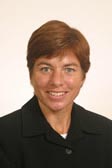
Lt. Col. Amy M. McCall
I am afraid you will think I am conceited or pretentious when I tell you how fortunate I am to have spent a year working in the Japanese government, but I share it only to show appreciation for the opportunity. I was working as an Air Force staff officer in the Pentagon and searching for something new when I came across an advertisement for the Mansfield Fellowship Program. Neither the application process nor the year of language training in Washington DC were easy, but I am so glad I managed to muddled my way through them. What awaited me in Tokyo was the experience of a lifetime. I started in the Operations Division of the Japanese Defense Agency, moved to the Cabinet Office for Peace Keeping Operations, and finished in the Air Staff Office, logistics division. I wanted to learn how the Japanese use or could use their Self-Defense Forces for international missions. I learned about this and so much more. The long hours, exhaustive research, and office hierarchies in the Japanese government were just a window into meeting some very dedicated and incredibly intelligent people. Thankfully, they were also very patient as they taught me about the PKO mission in the Golan Heights, the assistance to Iraq, and the supply mission in the Indian Ocean, to name a few operations. Because I am an Air Force logistician by trade, I naively assumed that the JASDF C-130 aircraft would be the only workhorse for the SDF’s international assistance. I was amazed to learn about the MSDF’s supply and humanitarian capabilities and the GSDF’s reputation for engineering. I didn’t even know that disaster relief was a primary mission for the SDF until I toured the bases and saw the equipment and training they use to assist Japanese communities in crisis throughout the year. Finally, words cannot describe the humility I felt as I barely mumbled a complete aisatsu in Japanese, and everywhere people graciously used their perfect English to explain the details and nuances of the government process for approving international missions for the SDF. I spoke to students at the National Defense Academy who look forward to international opportunities, aircrew returning from their fourth mission in Iraq, and generals who never expected to leave the country when they started their careers in the defense of Japan but now find themselves promoting the idea. I regrettably had to finish my fellowship in August 2006. Since then, the JDA has been upgraded to a ministry, and international assistance has become a primary mission of the SDF. For these reasons, and because I enjoyed it so much, I would love to repeat the whole experience. However, the U.S. Air Force has decided that the best place for me is at Yokota working bilateral logistics issues with my logistics friends in the ASO. I still daydream about ways the U.S. and Japan or Japan and other countries in the region could combine to provide regional disaster relief using the SDF’s skills and capabilities. However, I will have to leave these ideas to the politicians and professors and all those incredibly intelligent people I met as a Mansfield Fellow. I enjoy making logistics plans for bilateral exercises and training, and sometimes when I visit Ichigaya, I go back to my old desk for just for a moment and remember my life as a Mansfield Fellow.







COMMENTS0
LEAVE A COMMENT
TOP